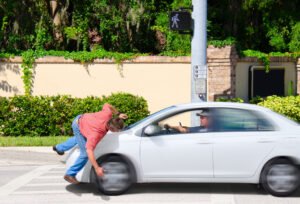
Most jurisdictions generally do not recognize a crime of “attempted vehicular manslaughter.” The reason involves the idea of “intent.”
You are usually guilty of the crime of attempt if you intend to commit a crime and perform some act towards the commission of that offense.
But you are usually guilty of vehicular manslaughter no matter whether or not you intended to harm or kill the “victim.” A prosecutor usually just has to show that you drove a motor vehicle in a negligent or unlawful manner and thereby caused the death of another person.
The lack of intent removes the ability for a prosecutor to bring an attempted vehicular manslaughter charge.
1. Is attempted vehicular manslaughter a real crime?
The criminal laws of most jurisdictions do not acknowledge a crime of attempted vehicular manslaughter.
A prosecutor usually has to prove the following to convict you of an attempted crime:
- you intended to commit a crime, and
- you took some act toward committing that crime.1
For example, you are likely guilty of attempted robbery if you:
- decide to rob a bank, and
- purchase a gun to help carry out the crime.
But a prosecutor does not have to prove intent to secure a conviction of a vehicular manslaughter charge.
The lack of intent removes the criminality within an attempt charge.
2. What is the crime of Vehicular manslaughter?
State laws vary slightly on the definition of vehicular manslaughter. However, most say that you commit this crime if you take a human life while:
- driving a motor vehicle with ordinary negligence, gross negligence, or recklessness,
- drunk driving or found in operation of a motor vehicle while violating a state’s DUI/DWI laws, or
- committing a traffic violation.2
There is no requirement in any of the above for a prosecutor to show that you intended to:
- drive unlawfully,
- break a law, or
- cause a fatal accident.
Note that some jurisdictions refer to vehicular manslaughter as “vehicular homicide.” The crime can lead to a misdemeanor or felony charge depending on the facts of the case.
Penalties can include:
- fines,
- a jail or state prison sentence, and/or
- a driver’s license suspension or revocation.
Some states have different degrees of the crime, such as:
- first-degree vehicular manslaughter, and
- second-degree vehicular manslaughter.
Penalties will differ depending on which degree of the crime you are charged with. Penalties can also grow more severe if you have a prior conviction or a criminal history.
If you are facing a vehicular homicide charge, you should seek legal advice from a criminal defense attorney or law firm.
A criminal defense lawyer will be able to inform you of your state’s specific vehicular manslaughter statute and the penalties you could face.
An attorney can also advise you on the defense strategies that are available in your case.
3. Is there an attempted negligent homicide crime?
As with attempted vehicular manslaughter, most jurisdictions do not recognize a crime of attempted negligent homicide.
You typically commit the crime of negligent homicide if you:
- commit an act of criminal negligence, and
- the act results in a victim’s death.3
As with vehicular manslaughter, there is no requirement that you have to show any intent to cause a death or perform some act.
In fact, while intent involves acting with a specific purpose or knowledge, negligence involves acting carelessly or without a particular purpose.
Therefore, it is generally inconsistent to try and apply an attempt charge to the crime of negligent homicide.
4. Is vehicular homicide the same offense as reckless driving?
No. Reckless driving is a separate and distinct offense than vehicular homicide.
You are generally guilty of reckless driving if you operate a motor vehicle with a disregard to the safety of others.
Acting with a disregard to the safety of others generally means that you:
- are aware that your actions present a substantial risk of harm, and
- intentionally ignore that risk.4
Note that if you drive recklessly and then take someone’s life, you would face the more serious charge of vehicular manslaughter.
Legal References:
- See, for example, Florida Statutes 777.04. See also Black’s Law Dictionary, Sixth Edition – “Attempt.”
- See, for example, California Penal Code 192c PC. See also Black’s Law Dictionary, Sixth Edition – “Vehicular homicide.”
- Black’s Law Dictionary, Sixth Edition – “Negligent homicide.”
- See, for example, People v. Schumacher (1961) 194 Cal.App.2d 335.

